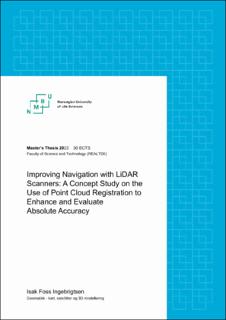| dc.description.abstract | This thesis is written as a collaboration with the Norwegian Mapping Authorities,
with the aim of improving a navigation solution for a mobile mapping vehicle, based on data from a LiDAR scanner. A navigation system often consists of several different
sensors, like GNSS receivers, Inertial Measurement Units, and an odometer. However,
these sensors do not always give flawless observations. Therefore, other sensors can be
necessary to contribute to the overall performance.
The thesis aims to explore the use of Point Cloud Registration algorithms to align a
georeferenced point cloud with a raw LiDAR point cloud, and further use the predicted
points to establish a quality measure of the navigation solution of the vehicle. The
program made to solve the problems is based on the Iterative Closest Points algorithm
and is implemented to work on point clouds with absolute coordinates.
The results show that aligning point clouds using Point Cloud Registration
algorithms will increase the absolute accuracy of a navigation solution with poor
accuracy. However, this alignment is not optimised for real-time use cases. A Kalman
filter must be used to combine the result from the alignment with the other sensors,
and be optimised for speed, in order to establish a fully operative navigation solution.
Using the program to establish a quality measure for a navigation solution has shown
to be a viable option if the absolute accuracy is unknown, as the model manages to
differentiate between a higher and lower absolute accuracy. This could be beneficial
to explore further, since quality control of navigation solutions from mobile mapping projects will, as a result, be a quality control of the delivered project itself. | |
